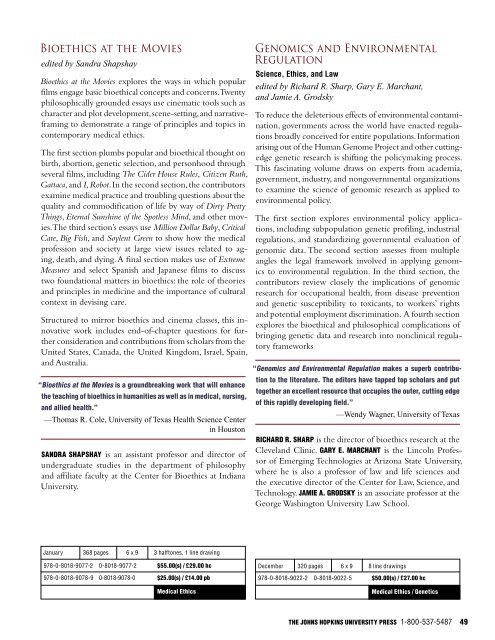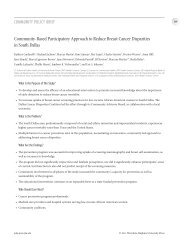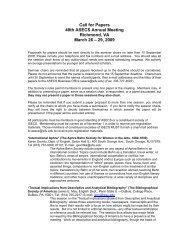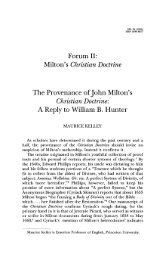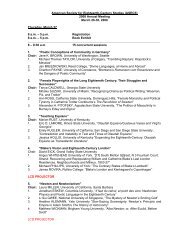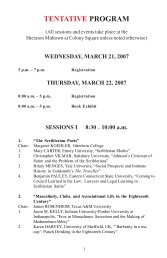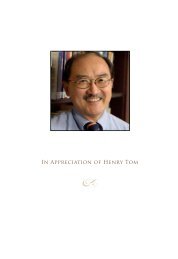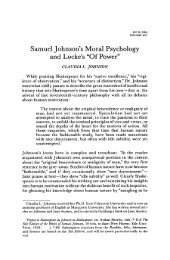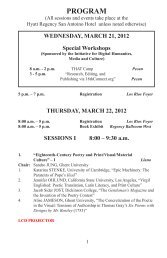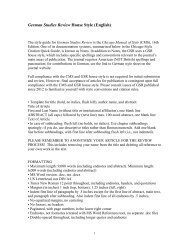Fall 2008 - The Johns Hopkins University Press
Fall 2008 - The Johns Hopkins University Press
Fall 2008 - The Johns Hopkins University Press
Create successful ePaper yourself
Turn your PDF publications into a flip-book with our unique Google optimized e-Paper software.
Bioethics at the Moviesedited by Sandra ShapshayBioethics at the Movies explores the ways in which popularfilms engage basic bioethical concepts and concerns. Twentyphilosophically grounded essays use cinematic tools such ascharacter and plot development, scene-setting, and narrativeframingto demonstrate a range of principles and topics incontemporary medical ethics.<strong>The</strong> first section plumbs popular and bioethical thought onbirth, abortion, genetic selection, and personhood throughseveral films, including <strong>The</strong> Cider House Rules, Citizen Ruth,Gattaca, and I, Robot. In the second section, the contributorsexamine medical practice and troubling questions about thequality and commodification of life by way of Dirty PrettyThings, Eternal Sunshine of the Spotless Mind, and other movies.<strong>The</strong> third section’s essays use Million Dollar Baby, CriticalCare, Big Fish, and Soylent Green to show how the medicalprofession and society at large view issues related to aging,death, and dying. A final section makes use of ExtremeMeasures and select Spanish and Japanese films to discusstwo foundational matters in bioethics: the role of theoriesand principles in medicine and the importance of culturalcontext in devising care.Structured to mirror bioethics and cinema classes, this innovativework includes end-of-chapter questions for furtherconsideration and contributions from scholars from theUnited States, Canada, the United Kingdom, Israel, Spain,and Australia.“Bioethics at the Movies is a groundbreaking work that will enhancethe teaching of bioethics in humanities as well as in medical, nursing,and allied health.”—Thomas R. Cole, <strong>University</strong> of Texas Health Science Centerin HoustonSandra Shapshay is an assistant professor and director ofundergraduate studies in the department of philosophyand affiliate faculty at the Center for Bioethics at Indiana<strong>University</strong>.Genomics and EnvironmentalRegulationScience, Ethics, and Lawedited by Richard R. Sharp, Gary E. Marchant,and Jamie A. GrodskyTo reduce the deleterious effects of environmental contamination,governments across the world have enacted regulationsbroadly conceived for entire populations. Informationarising out of the Human Genome Project and other cuttingedgegenetic research is shifting the policymaking process.This fascinating volume draws on experts from academia,government, industry, and nongovernmental organizationsto examine the science of genomic research as applied toenvironmental policy.<strong>The</strong> first section explores environmental policy applications,including subpopulation genetic profiling, industrialregulations, and standardizing governmental evaluation ofgenomic data. <strong>The</strong> second section assesses from multipleangles the legal framework involved in applying genomicsto environmental regulation. In the third section, thecontributors review closely the implications of genomicresearch for occupational health, from disease preventionand genetic susceptibility to toxicants, to workers’ rightsand potential employment discrimination. A fourth sectionexplores the bioethical and philosophical complications ofbringing genetic data and research into nonclinical regulatoryframeworks“Genomics and Environmental Regulation makes a superb contributionto the literature. <strong>The</strong> editors have tapped top scholars and puttogether an excellent resource that occupies the outer, cutting edgeof this rapidly developing field.”—Wendy Wagner, <strong>University</strong> of TexasRichard R. ShaRP is the director of bioethics research at theCleveland Clinic. Gary E. Marchant is the Lincoln Professorof Emerging Technologies at Arizona State <strong>University</strong>,where he is also a professor of law and life sciences andthe executive director of the Center for Law, Science, andTechnology. Jamie A. Grodsky is an associate professor at theGeorge Washington <strong>University</strong> Law School.January 368 pages 6 x 9 3 halftones, 1 line drawing978-0-8018-9077-2 0-8018-9077-2 $55.00(s) / £29.00 hc978-0-8018-9078-9 0-8018-9078-0 $25.00(s) / £14.00 pbMedical EthicsDecember 320 pages 6 x 9 8 line drawings978-0-8018-9022-2 0-8018-9022-5 $50.00(s) / £27.00 hcMedical Ethics / GeneticsTHE JOHNS HOPKINS UNIVERSITY PRESS 1-800-537-5487 49


